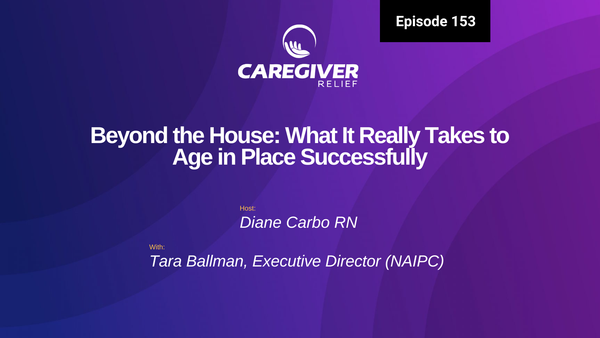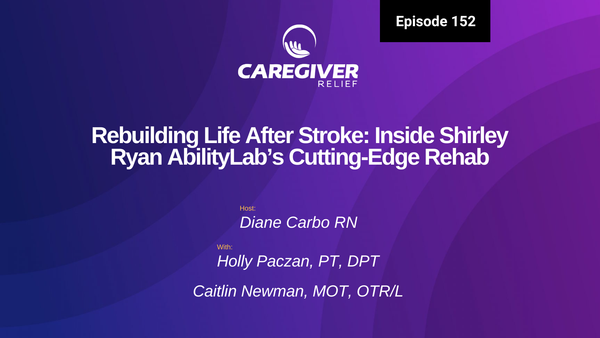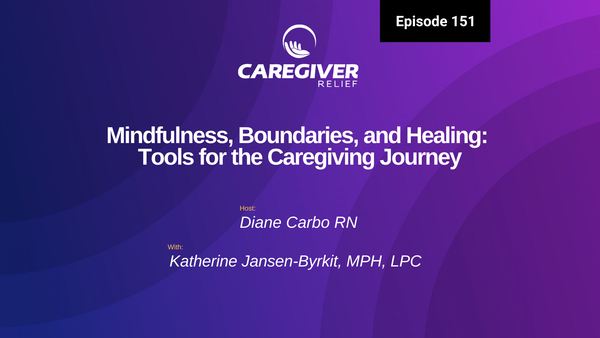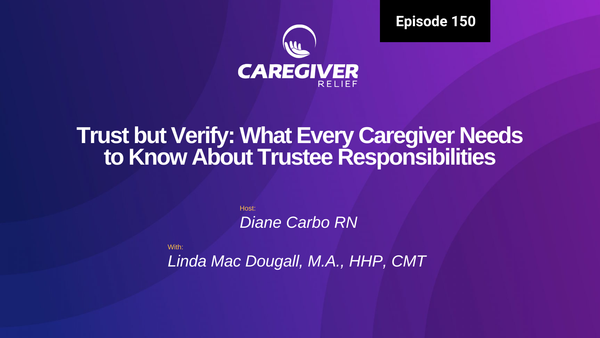How To Set Boundaries With A Narcissistic Parent - Episode 67
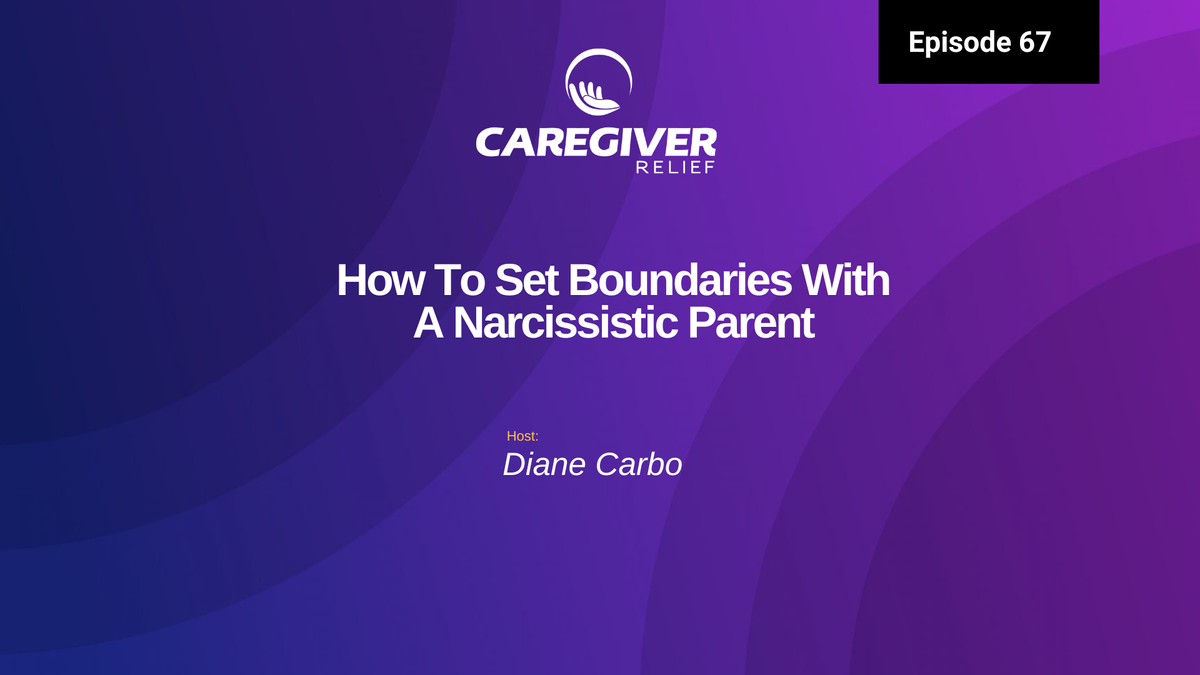
How to set boundaries with a narcissistic parent. There are so many challenges caregivers face. There are physical and medical issues of providing care. There is significant emotional and psychological issues that impact the care caregivers themselves. Caregivers often experience a variety of complex emotions during their caregiving journey.
The family caregiver is expected to adjust to those changes that are expected of them as they provide care. The most common emotion that caregivers report is caregiver guilt, most report feelings of frustration and anxiety, and constantly ask, asking themselves, now what do I need to do and how am I going to keep on doing it?
The answers to these questions often allude the caregiver as they continue on their caregiving journey. Being able to set boundaries is essential for every caregiver, mental and emotional wellbeing. Learning how to set adult boundaries with a narcissistic parent is even more important.
And more of a challenge because the narcissist has no regard for personal boundaries or limits. According to the Miriam Webster dictionary, boundary is defined as something that indicates or fixes a limit or extent. The definition for limits is something that bounds restrains or confines or to the utmost extent. So if you’re an adult child of a narcissist, you may have not have learned there was such a thing as a boundary. A narcissistic parent has always invaded your personal space and has used emotional blackmail to manipulate you to get what they want.
If you have never been able to get away from that toxic environment, you may still be in the throes of it. Setting limits or boundaries is challenging for most family caregivers. When I work with a family caregiver, I recommend that they rely on their gut feelings or what feels right to them When they are constantly tired, feeling irritable and having difficulty making decisions, it’s time to think about taking care of themselves. That advice is not what I would recommend to the adult child of a narcissist.
The narcissistic parent has groomed their children through emotional blackmail tactics that do not allow the child of an narcissist to trust their gut feelings. Most ignore those feelings, second guess themselves, and give into the many demands to avoid conflict. I’m going to go back to the story of Star and Edith. Star is the adult child of a narcissist, a malignant narcissist, and Edith is her mother. Star took care of her mom for five years.
During those five years, she consistently try to set boundaries, but we’ll go into that later. She ignored her feelings. She was always second guessing herself, and she always gave into the demands of her mom just to avoid conflict, and there was always conflict and drama with Star and her mom. If you are presently providing care for a narcissistic parent or find yourself living with them, it’s important to set healthy boundaries and then set limits with them.

This is to ensure your own sense of wellbeing. After decades of working with family caregivers, I have found that the majority feel uncomfortable setting boundaries. I’m a caregiver. I’m a professional caregiver. I’m a family caregiver. I am a people pleaser, so setting boundaries has been challenging for me when I was younger, so I understand it.
Most adult children of narcissists are terrified to set a boundary. They want to ignore their wishes to avoid the possible wrath of the narcissist. I often tell my clients that it is their responsibility to show others how to treat them. You do that by acknowledging and honoring your own needs and wellbeing. A narcissistic parent manipulates you because they know they can. They know the buttons to push to get the reaction they want.
The only way to stop a narcissist and any other person from walking all over you is to establish and maintain healthy boundaries. You must learn to set limits. So why should you set limits and boundaries? Oh, I have watched many adult children of a narcissist struggle to take those first steps on setting boundaries.
Many will do whatever it takes to keep peace, ignoring what is in their both best interest, because I have watched so many adult children of narcissists truly struggle. I think I first want to address why it is so important to set boundaries. Setting boundaries is making a clear statement on what you will and will not tolerate.
It is the line you do not want anyone to cross. Determining boundaries and identifying what your limits is easy. It’s implementing them. That’s hard for the average caregiver. For the adult child of a narcissist, you’ve spent most of your life accepting your narcissist, parents, mistreatments and mis-manipulations. I like to provide my clients with a page, as I call it, the caregiver rights.
So I want to share what those rights are. It is important that every family caregiver understand that they have the right to promote health and wellbeing for a successful caregiving journey. Caregivers have the right to enjoy open communications between the senior family member, friends and other caregivers.
They have a right to offer a point of view, opinion, or suggestions regarding the care when appropriate. Caregivers have the right to encourage and expect their family member to be independent for as long as possible. They also have a right to care for their own personal needs without feeling selfish or guilty.

This is living life as if your family member is still healthy. Taking care of yourself allows you to be a better caregiver, and yes, you do have rights. You are only human and you have limitations. Only you know what those limitations are. For the adult child of a narcissist, I’m going to add two more rights.
You have the right to be treated with respect and you have the right to your own privacy and personal space. Many adult children of narcissistic parents feel very important. Many feel they don’t deserve to have boundaries. You have the right to voice what is okay and not okay with you. Again. I’m going to bring us back to Star.
God bless her. She struggled so much. She would set a boundary and it would be just one Mom, you need to stay home while I’m going to work. And her mom would call the police. Tell them that she was abandoned. She would call a taxi and go to the store where Star was working and create a scene because she wanted Star at home.
Now, that’s the extreme, but I’ll tell you when you live with that kind of constant over- crossing of boundaries, you realize you don’t have boundaries with this person. I know the narcissist ignore boundaries because they think they’re superior.
They think they’re above the rules and limitations, and they actually lack the insight to even notice they’re violating a boundary in the first place. Star’s mother Edith, she didn’t care that she was crossing a boundary. She wanted what she wanted when she wanted it. This is the narcissist way of maintaining control over you.

They control you to make your personal boundaries completely non-existent. And with Star and Edith, Star had no boundaries. They were totally non-existent for her mom as Edith did. So many narcissists use guilt tripping, stonewalling, gaslighting threats, or straight up mans to get their way. So I understand the biggest fear is the backlash, the consequences you will face as you change the relationship dynamic.
Setting boundaries in any relationship is healthy. Setting boundaries with a narcissistic parent is not only healthy, it is necessary for your survival. You need to protect yourself and manage their abusive, manipulative, and emotionally abusive tactics. The tips and strategies I’m going to share with you today will also apply to other abusive and manipulative people in your life. So let’s get into the nitty gritty strategies to change your relationship dynamic. I think the first two thing you have to do is determine your boundaries. The adult child of a narcissist often have a hard time determining what they want, so what boundaries do you want to set?
In order to be able to set boundaries, you need to think about what you want, then decide how you can verbalize those thoughts. What are your buttons they push? Do they belittle you in front of others? Do they constantly tell you how to do things or how they could have been done better?
I am sure there are many things that they do that make you feel uncomfortable or upset. Accept that they will not likely respect your requests, but you still have the right to voice your needs. So take time and think about how you would like to be treated. There may be an endless list of things you want to address.
The important thing is you start with just one, the most important one to you. If you give them a litany of boundaries, they’ll only feel attacked and will most likely ignore you and your wishes. So express just one, just to see how that goes.
Then you can set more. Oh, just this one may be a challenge for a while. Always approach your narcissistic parent with care and caution. Saying anything they perceive as a possible slight against them will result in attacks and more emotional blackmail tactics. Okay. You’ve identified your first boundary.
Now you have to be clear and vocal. It’s important to be direct, brief, and consistent. Be clear and concise on what you will and will not tolerate, and what the consequence for violating that limit will be. If you feel uncomfortable at first, and trust me, you will. We all do. Do it over the phone or by email or whatever feels the least stressful for you. Star wanted to go across the world, to the other side of the world, when she told Edith her boundaries that she wanted to set. Understand that if you seem uncertain or unsure about your boundaries, the narcissist will not respect them or honor them.
Be prepared to identify and set consequences for when those boundaries get violated. Without any consequences, boundaries are meaningless. So when setting boundaries, you can tell them what happens if they don’t respect them. Now we know that narcissists don’t care about how you feel.
They don’t react to statements. They ignore whatever is right or wrong. They are unable to listen to reason, but here is the key to setting boundaries. They do care about how it will affect them. That’s important. If the narcissist understands that violating your boundaries will result in consequences they dislike or things that will inconvenience them, that might stop them doing whatever it is they’re doing because it has a negative impact on them. When identifying the consequences, make sure it’s actually something you will be able to follow through with.
Star started big, I encouraged her not to. A lot of us encouraged her not to in our caregiving group. But she would always say to her, mom, I’m just going to put you in a home if you don’t stop these behaviors. And that doesn’t work. Of course, it. Edith was very challenging, and I know that there are a lot of you out there that have a narcissistic person in your life that is smothering you and controlling you and challenging you.
So I don’t make light of this at all. Here’s the important thing. If they do not suffer any consequences for ignoring your boundaries, they’ll just do it over and over again. And that’s what happened with Star and Edith. Star should have said things like, set a boundary, Mom, I’m going to work. I’ll bring something home for you after work. Adult children of narcissist may or may not be fine with having a difference of opinion. Some over the years still feel they need to stand up and debate their point of view.
Some of you are just not broken and you still have that spitfire. I’m going to argue in my point of view. This is the time when the narcissistic parent will start the emotional blackmail tactics. They may want to, they will start to demean you, start the name calling and the insults. If this is something yet you have endured in the past, it is time to put a stop to allowing them to treat you that way.
It is time to tell them that this is a line you will not allow to be crossed anymore. Let them know. Say, if you continue to insult me or call me names, I’ll leave the room or hang up the phone. And if they ignore your boundaries and continue to call you those names, or demean you or demoralize you, you need to do what you said what you were going to do.

Leave that room. Hang up the phone. It’s so important to stand your ground. Now, trust me, I realize it’s not easy but you do not refuse to give in. That’s why you start small, don’t call me names, respect me. Maybe the first step, first boundary you set. And every single time they open their mouth to say something, you put your hand out and you go, stop.
I will not tolerate that. This may be the very first time you give them the message that you will no longer tolerate them attacking you. Let them know your boundaries are non-negotiable. Do not try to have a meaningful discussion about your boundaries. Do not try to argue your point of view. Don’t try to explain or elaborate.
Simply state your boundaries. Keep it brief. Do not discuss it further. Make the interaction as short as possible. I know that many of you feel angry, fearful, and frustrated. Oh gosh, do I get that? It is a time when you need to try your very best to remain consistent.
If you are inconsistent or waver, it might seem like you’re uncertain about your decisions. Indecision will give them a chance to push your buttons and poke at your vulnerabilities. So prepare your boundaries ahead of time and stick to them. When your narcissistic parent does, cross the line, enforce your established consequence.
Then there, and trust me, there will be multiple attempts to ignore your boundaries when you make a decision to set that boundary. Be prepared for being challenged, and this will be very difficult. You are standing up to your parents who have controlled basically every aspect of your life, taking this step to set boundaries as necessary for your physical and emotional wellbeing. Be prepared for the worst possible response, your narcissistic parent may react aggressively. That’s what Edith did with Star. Others may use emotional blackmail tactics like guilt tripping, or even feigning an illness. They’re going to try to play the pity party card. Either way, your narcissistic parent will find a way to make it that you are the problem. They will turn this around and make it your fault. You’re too sensitive, you’re selfish. They may even accuse you of not loving them. They definitely will accuse you of being crazy, but stand your ground. They will do whatever it takes to continue to push the limits and ignore your boundaries.
They’ll try to push those buttons. They will try to negotiate, and Lord knows they will push you into an argument. But stand your ground, never back down from the consequences and let them, or let them change your mind. I talk about Star and Edith. Star wavered often. It took her five years to stick to setting limits and boundaries.
She wavered and gave into her mother’s emotional tactics. Sadly, Star paid the ultimate price. The stress and demands of caring for a narcissistic parent took a severe toll on Star’s Health. So as difficult as it is you are putting your foot down. Show them that this is unnegotiable. Do not respond to their tactics.
No matter what they do, show them that you’re serious about this. Like Star, you’re going to be really tempted to give in. It’s a lifelong pattern that you’re feel you’re familiar with. It’s a learned pattern of behavior. You need to break that pattern. Most likely you have given into their demands many times before, but try your best.
Most narcissists remember, lack self-confidence. They try very hard to make others feel small so that they feel better about themselves. Here’s a tip. If you stand your ground and address your boundaries and identify consequences, it’ll catch them off guard. Simply. It’s as simple as Mom, I can no longer tolerate your demeaning me. I don’t want name calling. I don’t want you insulting me. And the response by your narcissistic parent is you stupid dumb rah, whatever.
Put your hand up. Say, stop. If you continue this behavior, I’m leaving the room. And then do it. Now remember, the narcissistic parent is used to beating you down. It is time to show them that they can no longer do that. Confidently saying so may help. Be prepared to call them out if they get close to crossing the line. I’ve seen adult children of a narcissist interacting with their parents. And when we initiate the initial technique of, stop, don’t say that. I’ll walk out of the room. It’s sometimes the conversation never gets past. Stop. Stop with a handout. Put your hand out in front of you.
As in stop, and it does get challenging and it gets exhausting, but you have to be prepared to call them out. Do not even let the small things slide. They will push inch by inch until they have crossed your boundary. They are just waiting for you to have a moment of weakness. They will try to draw you into their web and get you to try to explain or defend your boundaries.
They want you to argue and manipulate you so it really is best to stay brief and direct with them. When they want to have a further discussion, change the subject, shift to something else, or just leave the room. You can answer genuine questions if they have any. That’s hard to believe that they would, but okay.
Just don’t fall for their pity parties, their guilt trips, their accusations, their threats, they’re gaslighting or their interrogations. Try your best to not respond at all, not negatively or positively when your boundary is crossed. Your narcissistic parent will push the out boundary to get a reaction out of you.
If you react negatively in any way, it continues to give them power over you. Instead, when your parent crosses your boundary, simply restate what your boundary is, then enforce the consequences you have identified. They’re going to make repeated attempts to cross, you’ll be tempted to argue or react in anger. This is when you need to take this step and learn to take a deep breath and calm yourself. Breathing, thinking about something else for just the moment.

To get ahold of yourself and control your emotions is important. So learn to take that deep breath and calm yourself. Then just simply restate your boundary, enforce the consequences, then remove yourself from the situation. It will be hard, but you try your best not to argue. Arguing with them gives them an excuse to attack you.
This is what I want when I say you need to be unemotional. You need to focus on remaining indifferent. Ignore them if you have to. They will intentionally cross your boundary. They want to hurt you. They want to get a reaction out of you. They want to regain control over you. This is what they call a form of narcissistic baiting.
They want to see you hurt, upset, sad, scared, and upset. As hard as it is when this happens, all you can do is ignore them. Remain indifference. Try to remain unemotional. Take those deep breaths in. Take time to breathe When you are communicating with them, use one word responses or even sounds or avoid eye contact with them. Show no interest in what they are saying to you. Even if it’s causing you to feel hurt inside, hide your feelings. Do not show them that you are hurting or upset in any way. Oh, is it going to be hard? Remember, they intentionally tried to get a reaction out of you if you give them what they want.
They’ll just keep doing it. Think of them like a toddler having a temper tantrum. Toddlers will cry.
Introduction to Setting Boundaries
Setting boundaries is an essential aspect of maintaining healthy relationships, particularly with individuals who exhibit narcissistic tendencies. Narcissistic parents, in particular, can be challenging to deal with, as they often disregard the emotional and mental well-being of their children. Establishing clear boundaries is crucial for protecting one’s mental health and preventing narcissistic abuse. By understanding the importance of setting boundaries and learning effective strategies for communicating them, individuals can develop the skills necessary to navigate complex relationships with narcissistic parents. This section will provide an overview of the importance of setting boundaries and introduce the concept of narcissistic personality disorder.
Understanding Narcissistic Personality Disorder
Narcissistic personality disorder (NPD) is a mental health condition characterized by a lack of empathy, grandiosity, and a need for admiration. Individuals with NPD often exhibit narcissistic traits, such as a sense of entitlement, a tendency to exploit others, and an inability to form healthy relationships. Narcissistic parents, in particular, can be damaging to their children’s emotional and mental health, as they often prioritize their own needs and desires over those of their children. Understanding the characteristics of NPD is essential for developing effective strategies for setting boundaries and maintaining healthy relationships with narcissistic parents. This section will provide an in-depth examination of NPD and its effects on relationships.
Setting Boundaries with Narcissistic Parents
Setting boundaries with narcissistic parents can be challenging, as they often resist or disregard boundaries. However, establishing clear boundaries is essential for protecting one’s mental health and preventing narcissistic abuse. To set boundaries effectively, individuals must first identify their own needs and values, and then communicate those boundaries clearly and assertively. It is also essential to establish consequences for when boundaries are not respected and to be willing to enforce those consequences consistently. This section will provide guidance on setting boundaries with narcissistic parents, including tips for communicating boundaries effectively and managing conflict.
Communicating Boundaries Effectively
Communicating boundaries effectively is crucial for maintaining healthy relationships with narcissistic parents. When setting boundaries, it is essential to be clear, direct, and assertive, avoiding ambiguity or mixed messages. Individuals should also be prepared to enforce consequences when boundaries are not respected, and to prioritize their own emotional well-being. Effective communication of boundaries can help prevent conflict and promote healthier relationships. This section will provide tips and strategies for communicating boundaries effectively, including how to use “I” statements, set clear consequences, and prioritize self-care.
Managing Conflict and Emotions
Managing conflict and emotions is an essential aspect of setting boundaries with narcissistic parents. Individuals must be prepared to handle resistance, anger, or guilt-tripping from their parents, and to prioritize their own emotional well-being. This can involve seeking support from friends, family, or a therapist, and engaging in self-care activities such as exercise, meditation, or spending time in nature. By learning effective strategies for managing conflict and emotions, individuals can maintain healthy boundaries and promote more positive relationships with their narcissistic parents. This section will provide guidance on managing conflict and emotions, including tips for staying calm, setting clear consequences, and prioritizing self-care.
FAQ: How to Set Boundaries with a Narcissistic Parent
Why is setting boundaries with a narcissistic parent important?
Setting boundaries with a narcissistic parent is crucial for protecting your mental and emotional health. Narcissistic behavior often includes emotional manipulation, inappropriate comments, and attempts to control or guilt-trip you. Establishing healthy boundaries helps safeguard your emotional well-being and prevents narcissistic abuse.
What are narcissistic traits I should recognize before setting boundaries?
Common narcissistic traits include a lack of empathy, emotional manipulation, name-calling, negative comments, guilt-tripping, and an inability to respect your personal space or emotional boundaries. Recognizing these signs helps you manage interactions and set adult boundaries effectively.
How do I start setting boundaries with a narcissistic mother or father?
Start by calmly and clearly explaining your own wishes and expectations. Use simple language and stay firm. Be prepared for conflict or guilt-tripping tactics when you assert your needs. It’s vital to protect your personal space and emotional health without feeling selfish or guilty.
What are examples of healthy boundaries I can set?
Examples include:
- Limiting phone calls that create conflict.
- Refusing to tolerate inappropriate comments.
- Setting non-negotiable topics during conversations.
- Leaving situations where your emotional boundaries are repeatedly violated.
Healthy boundaries prioritize your well-being and mental health.
How should I handle violations of my boundaries?
If a narcissistic parent continues to disrespect your boundaries, calmly restate them and explain the clear consequence for repeated violations. If things slide too much, it can reinforce their behavior. Consequences may include limiting contact or, in some cases, cutting contact entirely to protect yourself.
How can I avoid feeling attacked or selfish when setting boundaries?
Remember, protecting your emotional health is not selfish—it’s necessary. Narcissists may label you as the "bad guy" or a "victim" when you assert your needs. Practicing self-care, boosting your self-confidence, and realizing you have the right to manage your own life are key steps.
What should I do when my parent uses emotional manipulation like guilt-tripping?
Stay grounded in your point and avoid being pulled into emotional manipulation. Keep conversations short if necessary, and ignore baiting behavior. Practice saying phrases like "I am not comfortable with this conversation" or "Please stop telling me how I should feel."
How do I maintain boundaries when inappropriate behavior continues?
Consistently enforcing boundaries is crucial. Don't let violations slide. If a parent continues with disrespect, name-calling, or crossing personal limits, you may need to reduce interactions, avoid certain conversations, or take stronger steps like setting a clear consequence or cutting contact.
Is seeking professional help a good idea?
Absolutely. Working with a therapist who understands narcissistic personality disorder and narcissistic abuse can help you gain control, strengthen your emotional well-being, and develop strategies for boundary setting without feeling isolated or overwhelmed.
What if setting boundaries creates conflict with the family?
Family members might not understand, especially if they are also influenced by narcissistic tendencies. Focus on your emotional health and well-being. Protecting yourself is the priority, even if it creates short-term discomfort. Respect yourself enough to maintain your boundaries.
How does the concept of Hopeful Panda fit into setting boundaries?
Hopeful Panda represents the idea of being firm but gentle—maintaining hope while protecting yourself. Setting boundaries with a narcissist doesn’t mean giving up hope for a healthier relationship, but it does mean being realistic about their behavior and your needs.
When should cutting contact be considered?
Cutting contact becomes necessary when:
- Boundaries are repeatedly violated.
- Narcissistic abuse escalates.
- Your mental and emotional health are seriously at risk. Ending or severely limiting contact can be an act of profound self-care and a step toward reclaiming your life and emotional stability.
What are quick tips for boundary setting with a narcissistic parent?
- Keep conversations brief and focused.
- Use one word or short phrases if needed (e.g., "No," "Stop," "Enough").
- Stay consistent even if you feel attacked.
- Prioritize your emotional well-being over keeping the peace.
- Create clear consequences for boundary violations.
- Practice self-care daily.
- Seek professional help if needed.
Final Note:
You deserve respect, emotional safety, and peace. Setting boundaries with a narcissistic parent is not about changing them—it's about protecting your right to live a healthy, fulfilling life.
Our Resources section can help you find the information and tools that you need. We have courses, videos, checklists, guidebooks, cheat sheets, how-to guides and more.
You can get started by clicking on the link below. We know that taking care of a loved one is hard work, but with our help you can get the support that you need.
Click here to go to Resources Section now!


